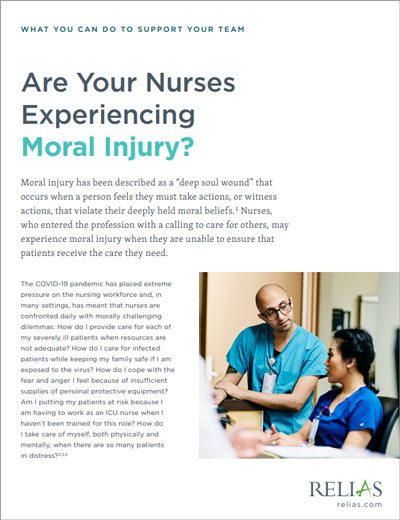The alarming rate of burnout among clinicians has been part of our conversation about what ails the healthcare system for a number of years. A recent report by the National Academy of Medicine states that 35% to 54% of U.S. nurses and physicians manifest significant symptoms of burnout—emotional exhaustion; depersonalization or cynicism; and reduced personal accomplishment. According to the report, factors contributing to nurse burnout include excessive workload, unmanageable work schedules, staffing ratios, inefficient workflows, time spent on administrative tasks and charting, and cumbersome technology, as well as a dearth of local resources to foster professional well-being.
Many clinicians, however, feel increasingly frustrated by discussions of burnout. Too often, these discussions frame the problem as one of broken people rather than a broken system, with solutions that often begin and end with strengthening personal resilience through self-care and better coping strategies. That may explain why the concept of moral injury has been gaining traction in the last couple of years as a way of describing the crisis at the heart of the healing professions.
Moral injury has been described as a “deep soul wound” that occurs when a person feels they must take actions, or witness actions, that violate their deeply held moral beliefs. Nurses, who entered the healthcare industry with a calling to care for others, may experience moral injury when they are unable to ensure that patients receive the care they need. They may feel a distressing disconnection between the values that led them into their profession in the first place and the realities that shape the compromises they must make from day to day, as financial and regulatory imperatives and inadequate care models shift focus away from the vital patient-clinician relationship.
Moral injury during COVID-19 and beyond
The COVID-19 pandemic has placed extreme pressure on the nursing workforce and, in many settings, has meant that nurses are confronted daily with morally challenging dilemmas. Indeed, recent articles in both the New England Journal of Medicine and JAMA describe sources of moral injury associated with the pandemic, such as fears of not being able to protect oneself, one’s patients, and one’s family because of insufficient supplies of personal protective equipment; not being able to provide quality care to every severely ill patient; or taking on roles for which one feels inadequately trained.
While the COVID-19 pandemic is unprecedented, it has also laid bare and amplified problems that were already troubling our healthcare system. For example, a range of factors were contributing to moral injury in nurses long before the pandemic, such as poor team communication, lack of input into clinical decisions, disagreements with physicians about patient care, unsafe staffing, and inappropriate use of resources. When nurses find themselves in situations where they feel they cannot live up to their own values, or where their teams are not meeting high standards of care, they may experience negative feelings about themselves, such as guilt or shame, as well as feelings of being devalued and voiceless, which can lead to distrust of colleagues or of the leaders of their organization. Intense feelings of moral injury can contribute to the development of mental health challenges, and the accumulating effect of moral injuries over time can have long-lasting effects on one’s sense of self.
Support your team by starting the conversation
As a nurse leader, you may not have the span of control to address all aspects and all levels of the problem of moral injury, but there are actions you can take to engage your team in working on local solutions.
The first step is to introduce or review the concept of moral injury with your team so that it can become a lens through which individuals think about their own experiences. This conversation could start as part of a huddle but also think about if there are other forums for discussion as well. For example, is there an ethicist affiliated with your organization who could facilitate a discussion? More informal peer groups can also be a venue for “soul repair” as team members forge connections with each other by sharing stories and reflections on situations where they experienced moral injury.
It’s important to also frame the issue in a positive light. While a focus on moral injury sheds light on the nature and contours of the problem, the goal is to move from an analysis of the current state to a vision of the desired future state. Thus, the conversation should also be about what joy could look like in the work environment. If moral injury is characterized by a sense of disconnection from one’s calling, then joy is, in part, a deep sense of connection to a calling; it’s when, at the end of the day, you feel a sense of fulfillment in being a nurse. What will it take to get there?
Once your team is thinking and talking about moral injury, you can work together to take action. If moral injury happens when a clinician feels that patients are not receiving high-quality care, then a question to pose to the team is, “What gets in the way of you or your team providing high-quality care?” Answers to this question that have to do with poorly designed workflows, problems with team communication, inefficient use of time or resources, etc., are candidates for the design, testing, and implementation of a change in practice.

Are Your Nurses Experiencing Moral Injury? What You Can Do to Support Your Team
Download this white paper to learn about seven ways to address moral injury with your team by building connections, including ways to both empower and protect your team members and to enhance both interpersonal and interorganizational communication.
Download White Paper →





